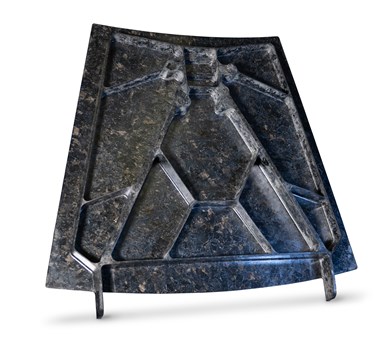Thermoplastic technologies to aid aerospace advancements
CAMX 2023: Sekisui Aerospace has developed thermoplastic technologies using its QForge process and continuous compression molding workcell to aid with endeavors in the aerospace industry.

Blocker door made using Sekisui Aerospace’s QForge process. Photo Credit: Sekisui Aerospace
Sekisui Aerospace (Renton, Wash., U.S.) has developed technology in lightweight composites and mobility solutions that signify its commitment to pushing boundaries and setting a benchmarks for excellence. The company seeks to improve the industry with digital transformation, safety, sustainability, customer satisfaction and aviation advancements.
Using its QForge process, Sekisui Aerospace developed a one-piece, rib-stiffened, thermoplastic blocker door, redesigning a 787 blocker door to prove the concept. This project and technology were funded by Sekisui Aerospace in alignment with its sustainability efforts and to improve its impact on the environment. QForge is a thermoplastic compression molding process using long discontinuous fiber-reinforced material and a molding process with zero scrap. Sekisui Aerospace says QForge parts are as strong and stiff as metals but have a 40% weight reduction compared to aluminum and an 80% weight reduction to steel.
An investment in continuous compression molding (CCM) thermoplastics technology and equipment to its facility in Renton, Wash., U.S. complements Sekisui Aerospace’s existing thermoplastic and thermoset production capability. The work cell is also strategically located adjacent to its Innovation Laboratory (iLab) – Research and Development Center. The technology addition enables Sekisui Aerospace to offer its customers a wider variety of manufacturing and process technologies for work packages. CCM adds breadth to its existing thermoplastics processing portfolio, which currently includes chopped fiber products produced at its Orange City, Iowa, facility.
The CCM workcell includes automated ply cutting and alignment, welding and testing equipment. This enables varying ply orientations and ply counts to produce solid laminate blanks of varying thickness and widths up to 24" in multiple shapes of continuous fiber structural profiles. Additionally, Sekisui Aerospace’s automated press cell (APC) with a robotic part transfer enables stamp forming of the CCM thermoplastic composite blanks.
“The ability to develop CCM solutions for customers in commercial aerospace and other industries, such as automotive, urban air mobility and military applications, allow us to differentiate ourselves through technology and serve our customers with innovative solutions for their current and future projects,” says Daniele Cagnatel, CEO and president at Sekisui Aerospace. “Investing in this automated thermoplastic capability is also another great step towards our commitments to eco-sustainability and aids our efforts in minimizing our impact on the environment by employing recyclable materials.”
Related Content
-
Jeep all-composite roof receivers achieve steel performance at low mass
Ultrashort carbon fiber/PPA replaces steel on rooftop brackets to hold Jeep soft tops, hardtops.
-
Developing repairs for thermoplastic composite aerostructures
HyPatchRepair project proves feasibility of automated process chain for welded thermoplastic composite patch repairs.
-
TU Munich develops cuboidal conformable tanks using carbon fiber composites for increased hydrogen storage
Flat tank enabling standard platform for BEV and FCEV uses thermoplastic and thermoset composites, overwrapped skeleton design in pursuit of 25% more H2 storage.














